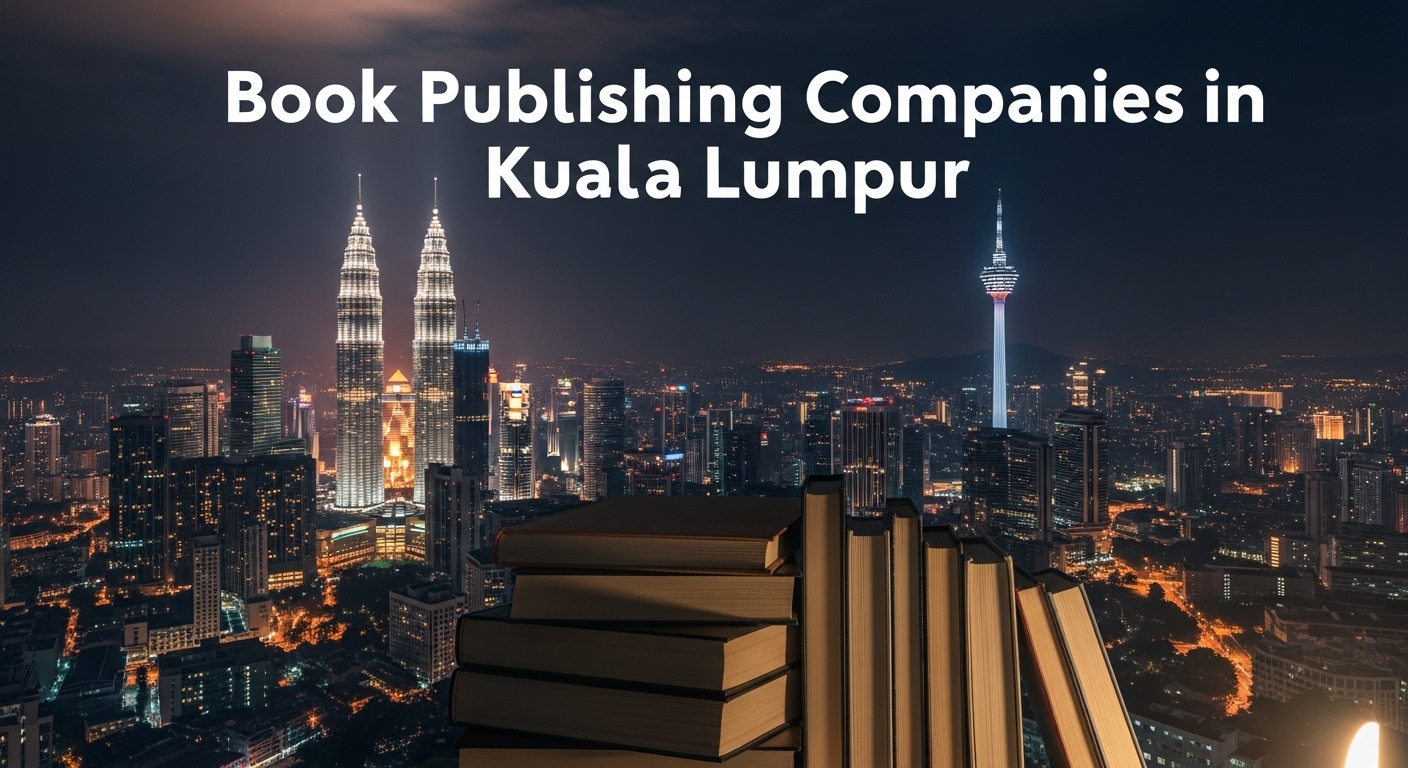
Kuala Lumpur is Malaysia’s publishing hub: a multilingual, multicultural market where government bodies, established commercial houses and nimble independent presses all coexist. Whether you write in Malay, English, Chinese or Tamil, the city offers routes to traditional publishing, print-on-demand and hybrid/self-publishing services.
1. Barnett Ghostwriting
Barnett Ghostwriting is primarily known as an author services and ghostwriting firm that offers manuscript development, ghostwriting, editing and publishing assistance. While not a traditional trade publisher that acquires and markets large lists, Barnett positions itself as a one-stop partner for authors who need hands-on help turning ideas into finished books — from developmental editing through to design and distribution support. Their model suits professionals, entrepreneurs and busy authors who want a managed route to publication rather than navigating every step alone.
2. Dewan Bahasa dan Pustaka (DBP)
Dewan Bahasa dan Pustaka is Malaysia’s national language and publishing institution. It has a long history of publishing Malay-language literature, reference works, and educational material, and plays a cultural role beyond commercial objectives. For authors writing in Malay, especially works of cultural, educational or scholarly relevance, DBP remains one of the most authoritative outlets in the country.
3. MPH Publishing
MPH is one of Malaysia’s better-known commercial publishing brands with a broad backlist across fiction, non-fiction, children’s books and educational titles. Historically tied to a network of bookshops, the imprint has been involved in mainstream literary and commercial titles that reach bookstores across Peninsular Malaysia. MPH is a useful option for authors aiming for wide retail distribution and established editorial pipelines.
4. PTS Media Group
PTS is a major player in Malaysian publishing, particularly prominent for education, children’s books and Malay-language titles. The group encompasses imprints and divisions that handle a wide range of genres; it is also active in book fairs and school markets. PTS’ scale and institutional know-how make it an important route to readers in local distribution channels, schools and libraries.
5. Karangkraf Group
Karangkraf is a diversified media and publishing company with roots in magazine publishing, newspapers and books. Over the years it has branched into book publishing across multiple genres, often with a strong presence in Malay-language market segments. For authors whose work aligns with popular culture, lifestyle or mass-market Malay readerships, Karangkraf’s reach remains relevant.
6. Fixi (Buku Fixi)
Fixi — often referenced as Buku Fixi for its imprint — has earned a reputation as an independent house focused on contemporary fiction and urban storytelling in Malaysia. Known for publishing fresh voices and genre-bending fiction in Malay and English, Fixi helped shape a modern reading scene that appeals to younger urban readers. If your manuscript is literary or crossover commercial fiction with a local voice, independent imprints like Fixi are worth considering.
7. Silverfish Books
Silverfish Books is an independent publisher and bookseller that focuses on literary fiction, translations and thoughtfully edited non-fiction. Independent presses such as Silverfish are vital to Kuala Lumpur’s literary ecology: they take risks on experimental writing, support translated work, and cultivate readers for niche and serious literature. Authors seeking editorial attention and a curated list-based identity often find independent presses attractive.
8. Gerakbudaya
Gerakbudaya is a small but influential independent press that has historically championed Malaysian modern and contemporary writing—often focusing on critical essays, literature and arts titles that have cultural value beyond immediate commercial returns. Independent and university-linked presses play an important role in nurturing critical discourse and scholarship in the city.
9. Sasbadi Holdings
Sasbadi is primarily recognized for educational publishing — textbooks, supplementary school materials and resources for Malaysia’s curriculum — but it also produces children’s books and general non-fiction. For authors of pedagogy, children’s literature or curriculum-related materials, educational publishers like Sasbadi provide distribution channels into schools and learning centres.
10. BookXcess / Independent Retail-Publisher Hybrids
While BookXcess began as a disruptive bookseller known for discount-oriented stores and a strong physical presence, its role in Malaysia’s book ecosystem has expanded to include curated publishing and book-related projects. Retailers that take on publishing-adjacent activities (special editions, local print runs, curated series) help create alternative routes to market, especially for authors who want bookstore visibility and creative distribution experiments. Similar hybrid models are an increasingly visible feature of Kuala Lumpur’s scene.
How these publishers differ
- National / institutional (DBP): Focus on cultural, linguistic and educational priorities. Gatekeepers often require alignment with institutional goals; distribution and prestige are strengths.
- Large commercial houses (MPH, PTS): Editorial and marketing infrastructures with established bookstore relationships; better for mainstream commercial reach.
- Independent presses (Fixi, Silverfish, Gerakbudaya): Editorially adventurous, willing to publish niche or literary work; smaller print runs but stronger brand identity among certain readers.
- Service providers / author-helpers (Barnett Ghostwriting and similar): Offer writing, editing and self-publishing services rather than conventional advance-and-royalty publisher deals; good for authors who want a managed route to publication.
- Hybrid retail-publishers (BookXcess-style): Useful when retail visibility is the priority and for creative marketing experiments.
The publishing process in Kuala Lumpur
- Decide your route: traditional submission to an editor vs. using author services / hybrid publishing vs. self-publishing. Each route has different timelines, costs and rights outcomes.
- Prepare a strong package: for fiction, a polished manuscript plus a concise synopsis and author bio; for non-fiction, a clear proposal with market positioning, chapter outline and sample chapters.
- Target appropriate houses: match the manuscript’s language, genre and audience to the publisher’s list. Independent presses welcome distinctive voices; large houses look for broad commercial appeal or proven niches.
- Understand contracts: key points are royalty rate, advance (if any), territorial rights, subsidiary rights (translation, audio), and reversion clauses. If you’re unsure, seek legal advice or an agent.
- Marketing and visibility: publishers vary in marketing resources; authors often need to participate actively in promotion (events, social media, school visits). Using a hybrid or service provider often means you or the provider take on marketing tasks usually handled by a traditional publisher.
Tips for choosing the right publisher or service
- Check recent titles: what has the publisher released in the last 12–24 months? Do those books resemble yours in tone and market?
- Ask about distribution: does the publisher place books in national bookstore chains, libraries, or export markets?
- Clarify costs and rights: service providers may charge for production; traditional publishers generally invest but retain certain rights — read contracts carefully.
- Look at editorial fit: ask about the editorial process and who will work on your manuscript. A good editorial relationship matters more than brand alone.
- Consider language and audience: Malaysia’s multilingual market means language choice affects publisher fit and sales channels.
Final thoughts
Kuala Lumpur’s publishing ecosystem in 2025 blends long-standing institutions, commercial groups, adventurous independents and a growing set of author services/hybrid models. Your best partner depends on language, genre, and whether you prioritise institutional prestige, mass distribution or editorial risk-taking. If you have a specific manuscript or target audience in mind, I can help you map the most appropriate submission or self-publishing pathway and draft a publisher-targeted proposal or query letter.
FAQs
Q: Is it better to go with a national publisher or an indie press in KL?
A: It depends on your goals. National publishers offer cultural reach and institutional prestige; indies offer editorial focus and niche audience development. Consider where your book fits.
Q: Are ghostwriting and publishing services reputable routes?
A: Author services and ghostwriting firms are legitimate options for authors who need writing and production help. They are not the same as traditional publishers: the author usually pays for services or works a hybrid deal. Evaluate credentials, sample work and contracts.
Q: How important are book fairs and events in Kuala Lumpur?
A: Very. Events — from national book fairs to independent launches and school visits — drive discoverability and community engagement. Publishers active in fairs often have stronger visibility.





